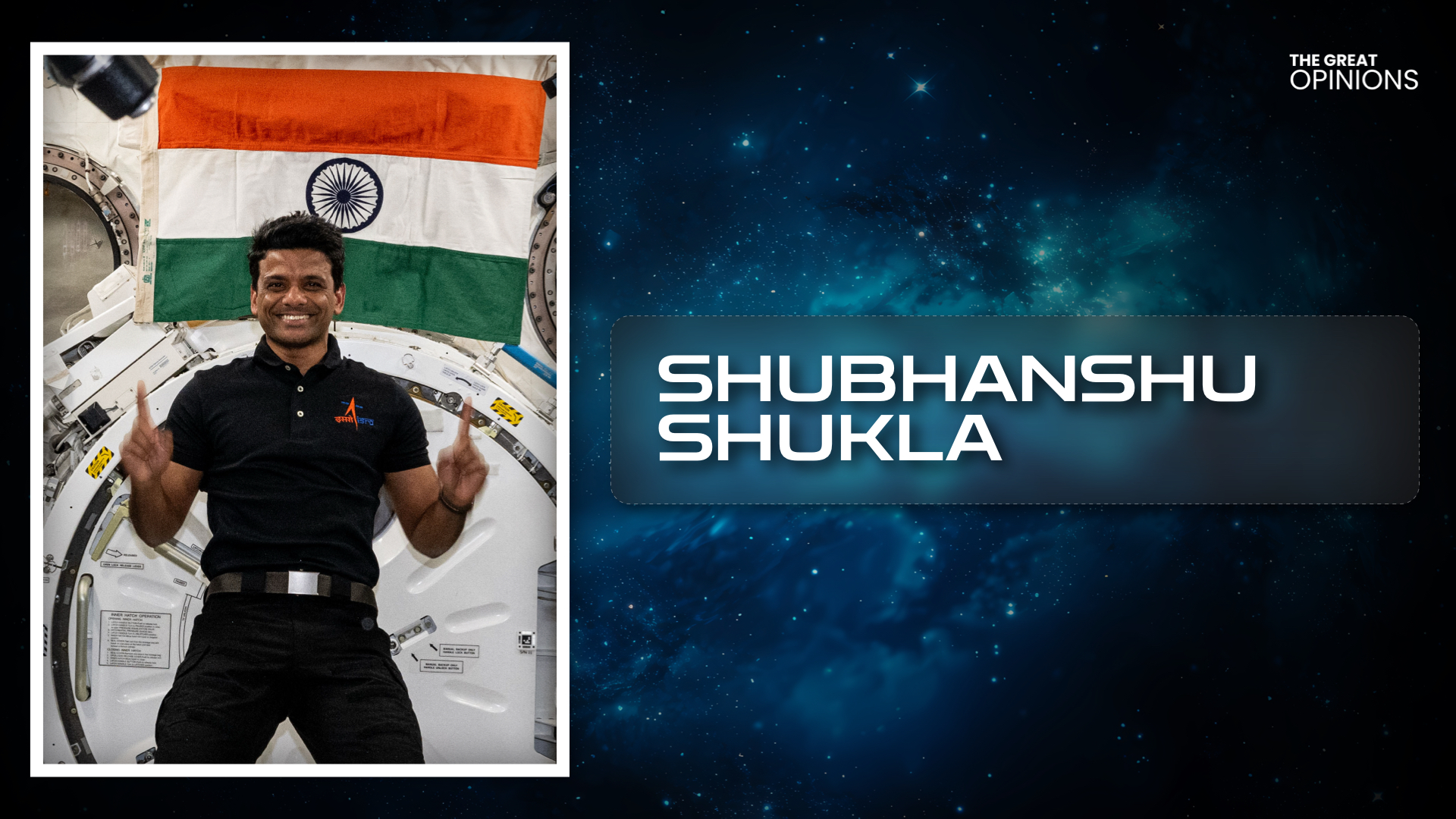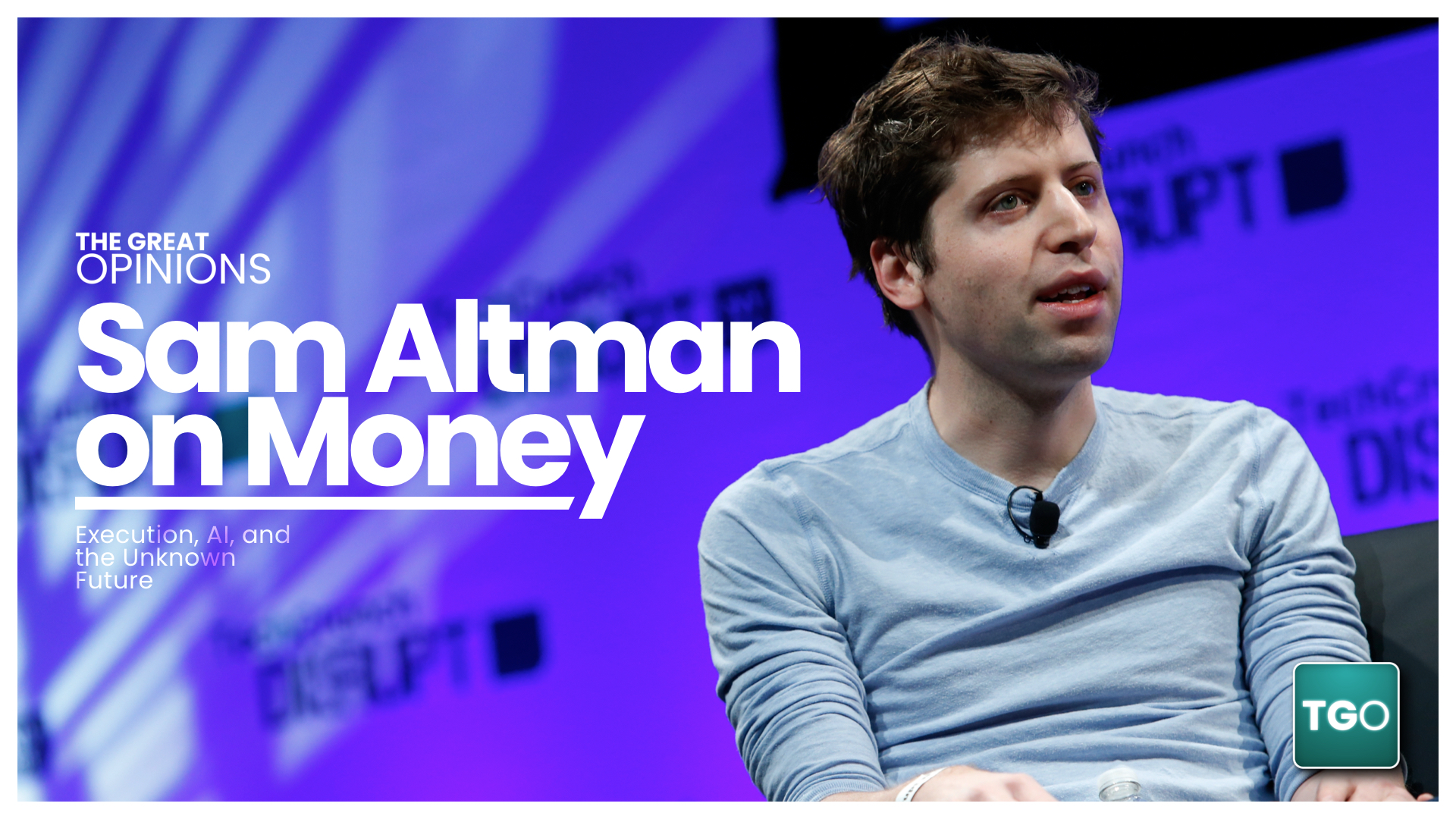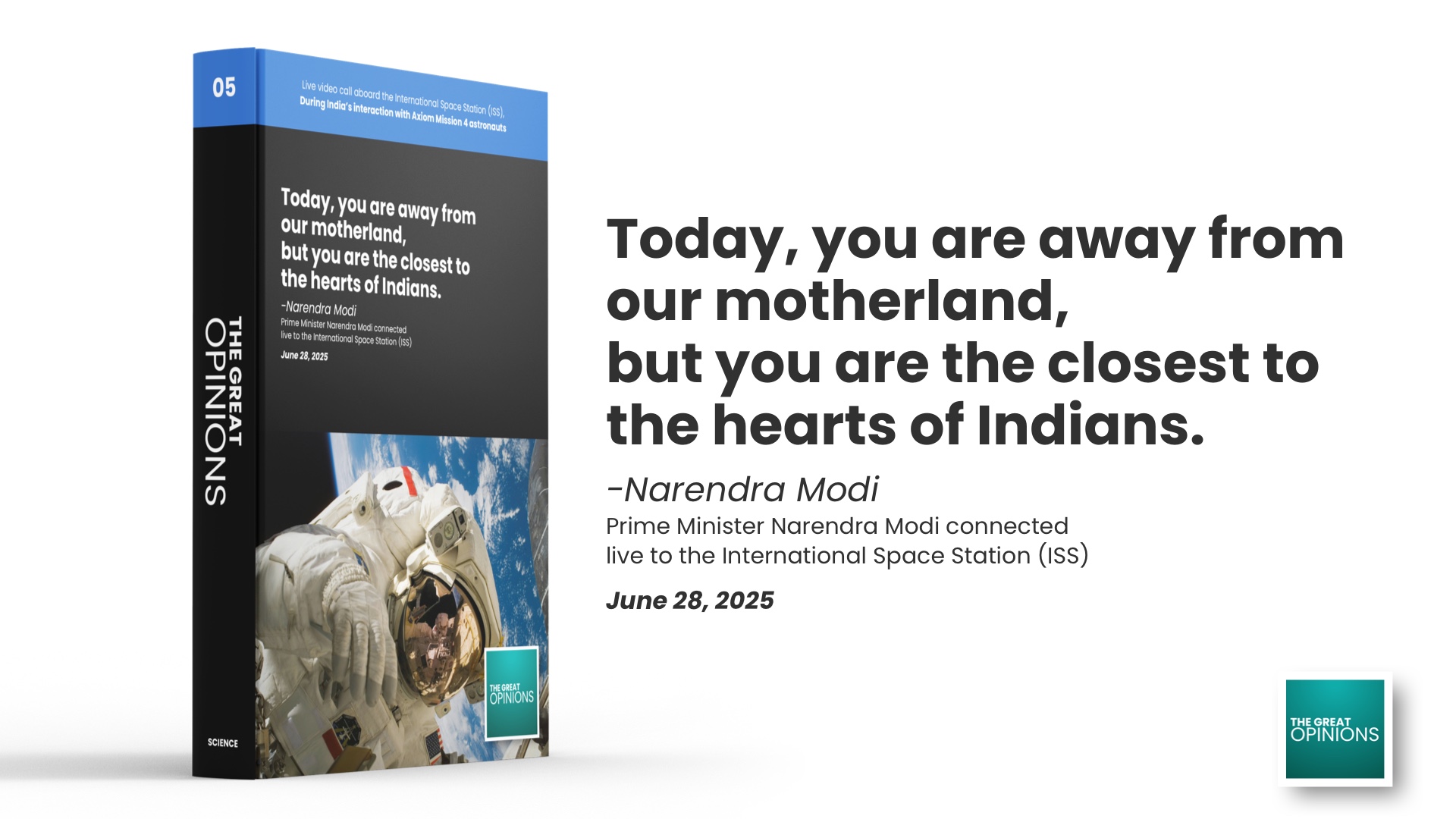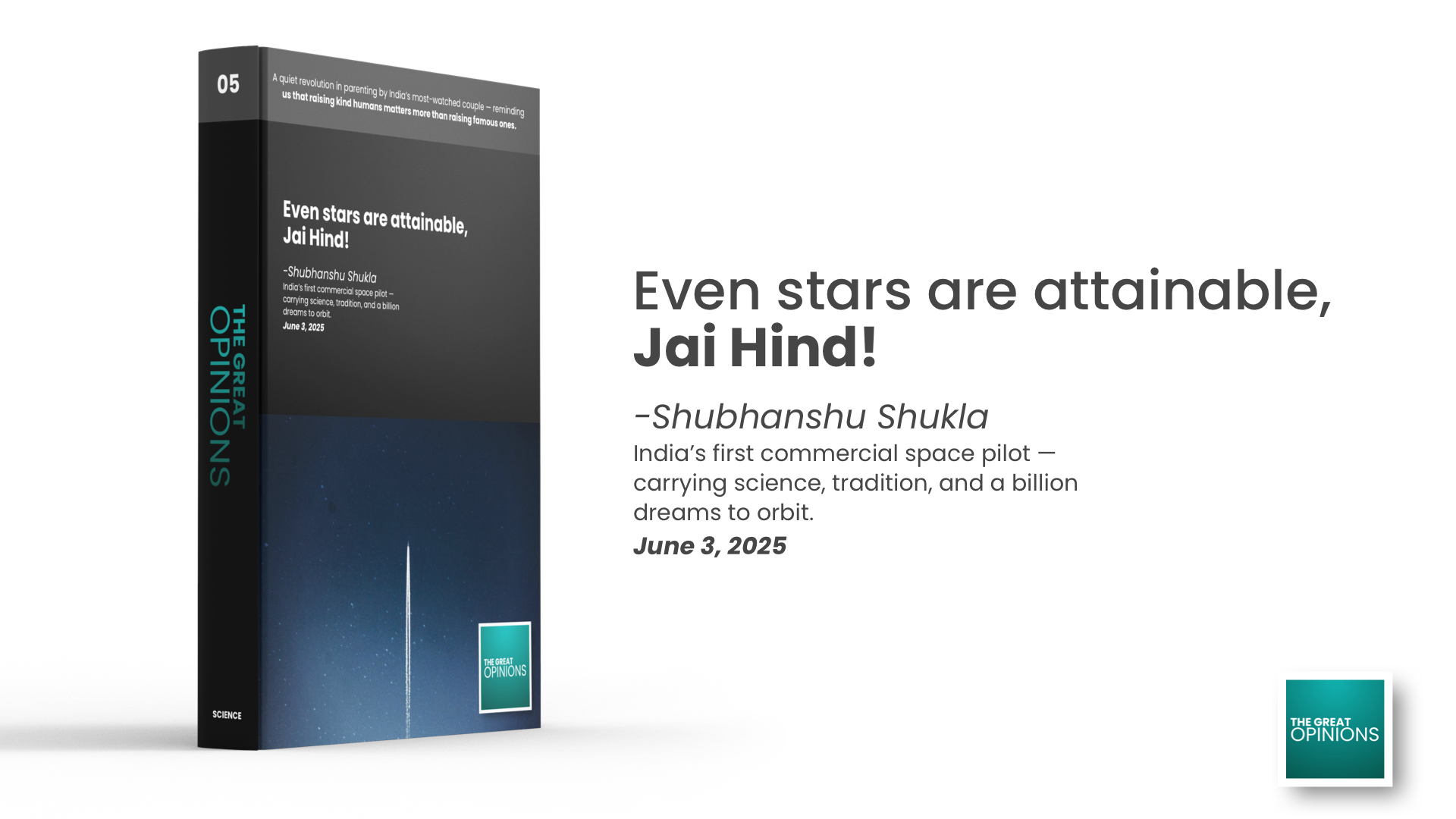Why This Story Matters
| FEATURE IMAGE LICENSE:By NASA Johnson Space Center – This image or video was catalogued by Johnson Space Center of the United States National Aeronautics and Space Administration (NASA) under Photo ID: iss073e0252429., Public Domain, https://commons.wikimedia.org/w/index.php?curid=169917854 |
When people think of astronauts, they often think of rockets, space suits, and ISS missions. But behind every astronaut is a story of persistence, resilience, and teamwork.
Shubhanshu Shukla, an Indian Air Force pilot turned astronaut trainee, embodies this truth. His journey is not just about space — it’s about philosophy, mindset, and leadership. And yes, it even has lessons about money and efficiency that apply to every entrepreneur and leader today.
1. Collaboration is Essential: No Astronaut Flies Alone
- The International Space Station (ISS) is the world’s largest peacetime collaboration.
- 15 countries, 240+ astronauts, thousands of scientists, and billions of dollars went into keeping it alive.
- Every spacewalk, every experiment, and every survival moment was a team effort.
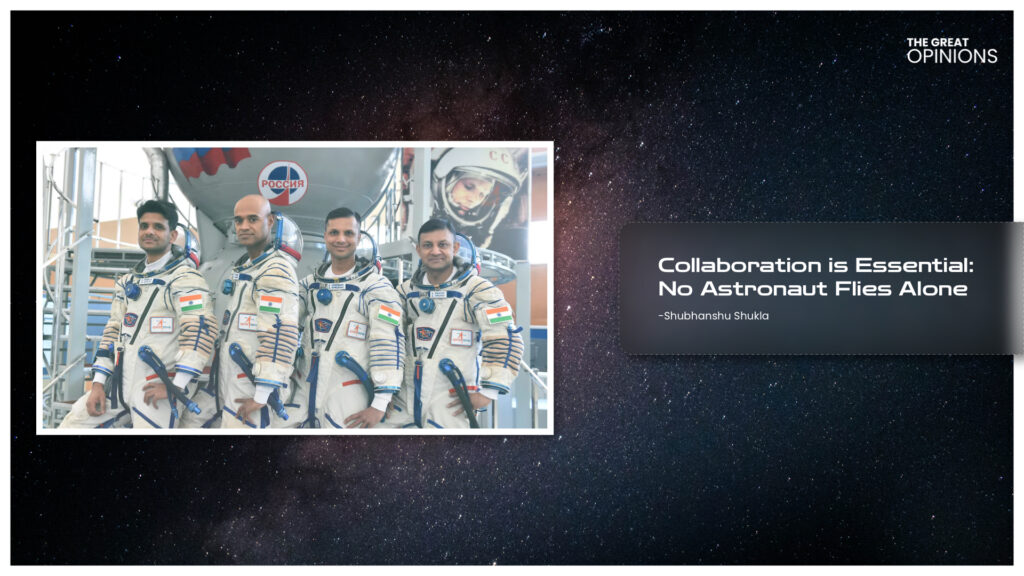
| By ISRO – Crafting India’s Space future at the Gaganyaan Astronaut Training Facility at 0:42, CC BY 3.0, https://commons.wikimedia.org/w/index.php?curid=145975633 |
The briefing room is crowded. Engineers from Bengaluru, Houston, Cologne, and Tsukuba are on a single screen. A practice docking for an ISS mission is about to begin.
The checklist is NASA-style, the comms discipline pure IAF. Someone on the call jokes that if you search “shubhanshu shukla wiki” you’ll find fewer lines than the lines on today’s timeline. Everyone laughs. Then the timer starts.
Shubhanshu calls out the approach vector. A European flight director cross-checks the numbers. A Japanese systems lead shadows the thermal loop. Back home, a young cadet—curious after seeing “shubhanshu shukla news” trend—Googles “shubhanshu shukla in space” and watches the public sim stream. What she sees isn’t a hero at a console. She sees a team that speaks in short verbs and long trust.
Lesson for us: Whether you’re building a startup, leading a team, or handling your career, collaboration multiplies outcomes.
In Shukla’s case: His IAF training in joint missions prepared him for international teamwork in astronaut programs.
2. Persistence Changes History
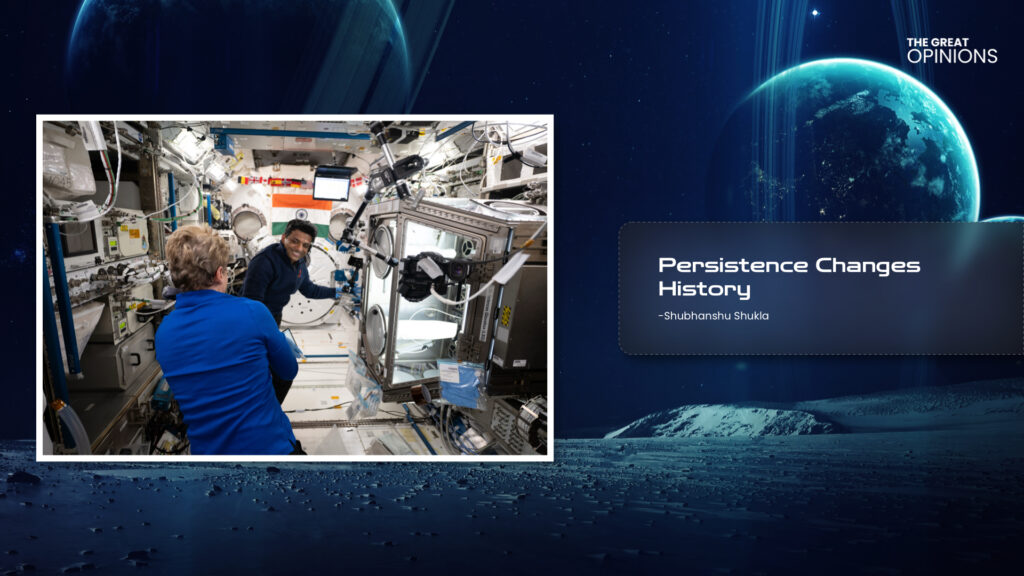
| By NASA Johnson Space Center – This image or video was catalogued by Johnson Space Center of the United States National Aeronautics and Space Administration (NASA) under Photo ID: iss073e0252954., Public Domain, https://commons.wikimedia.org/w/index.php?curid=169917892 |
Astronaut selection is brutal:
- NASA stats: Over 12,000 applicants in 2021, only 10 were chosen (0.08% selection rate).
- Peggy Whitson, Shukla’s commander during training, was rejected 9 times before she got in. She later became NASA’s first female ISS commander.
Nine rejections. That’s what Peggy Whitson endured before she flew. In a quiet mess hall, Shubhanshu scrolls “shubhanshu shukla news” on his phone and smiles at a rumor about “shubhanshu shukla age.” It’s funny—people think the number matters. The real number is attempts.
He remembers long nights after IAF sorties, when he opened thick manuals instead of Netflix. He studied orbital mechanics like a second language. He wrote his own “shubhanshu shukla astronaut biography” in notes apps—dates, drills, mock-checkouts, every small win. He bookmarked articles on NASA selection cycles and kept a folder titled “shubhanshu shukla education” to remind himself that learning is a moving target, not a line on a resume.
Shubhanshu’s story mirrors this persistence. From fighter pilot cockpits to astronaut simulations, every “No” was just preparation for the big “Yes.”
👉 Lesson for us: Your rejections aren’t the end. They’re rehearsal.
3. Resilience is a Mindset (Not a Skill)
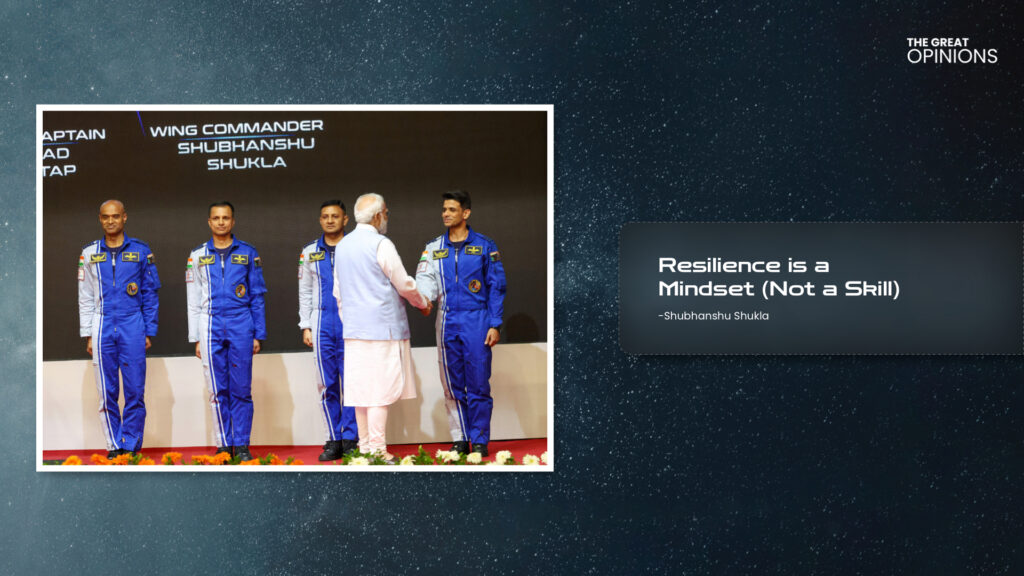
| By Press Information Bureau (GODL-India), GODL-India, https://commons.wikimedia.org/w/index.php?curid=145881027 |
Here’s something people don’t realize: 80% of astronaut training is about failure.
- Fires in oxygen-rich environments.
- Leaks inside modules.
- False alarms that can cost lives if ignored.
Shukla learned the same resilience:
- In IAF missions, one misstep could cost an aircraft.
- In astronaut training, one missed checklist could risk an entire crew.
The sim smells like metal and stale coffee. An alarm stabs the air: FIRE. Oxygen rich. Bad combination. Shubhanshu moves without drama. He rehearsed this hundreds of times. He seals, checks, breathes. The panel goes from red to amber to green. Another alarm: LEAK. He floats, patches, calls. Outside, a trainer whispers, “He never speeds up, he never slows down.”
Later, a reporter compiling “shubhanshu shukla wiki” asks about fear. He says, “The point of alarms is not to scare you. It’s to keep you on script.” Somewhere a headline pops: “shubhanshu shukla nasa-style drills prepare for iss.” Commenters debate the exact mission timeline. He ignores it and returns to the binder.
Lesson for us: Don’t curse the fire alarm. Suit up, fix it, and move forward step by step.
4. Teamwork is Action (Not Just Words)
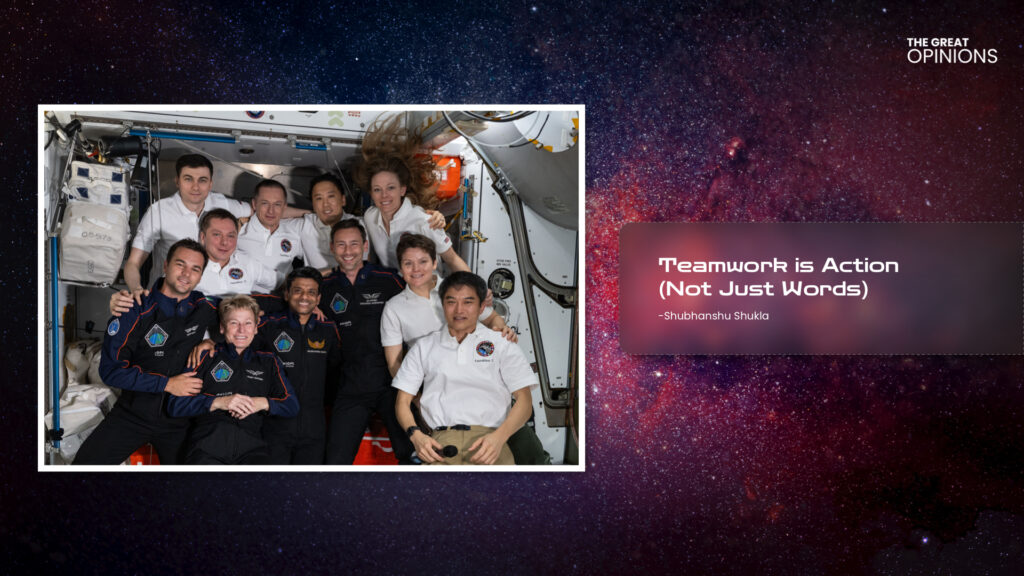
On Earth, teamwork means office coffee chats and brainstorming sessions. In space, it means:
- Handing over an oxygen mask in seconds.
- Sharing the last pouch of water during a malfunction.
- Watching your crewmate’s back while you repair a solar panel.
Shukla often talks about how the smallest gestures from his peers were often the biggest survival moments.
A glove sticks. A tether tangles. A tool drifts. Tiny things, deadly context. In a neutral-buoyancy run, Shubhanshu’s partner taps his wrist twice—your left latch isn’t seated. No speech. Just action. They fix it. They continue. Afterward, the debrief turns that tap into a line item for the astronaut biography: micro-signal saved macro-time.
On the ground loop, an intern who discovered him through “shubhanshu shukla news” whispers, “I want this job.” She thought space was equations. Now she sees the human choreography.
Lesson for us: Great teamwork isn’t about grand speeches. It’s about tiny, consistent actions.
5. Representation is Power
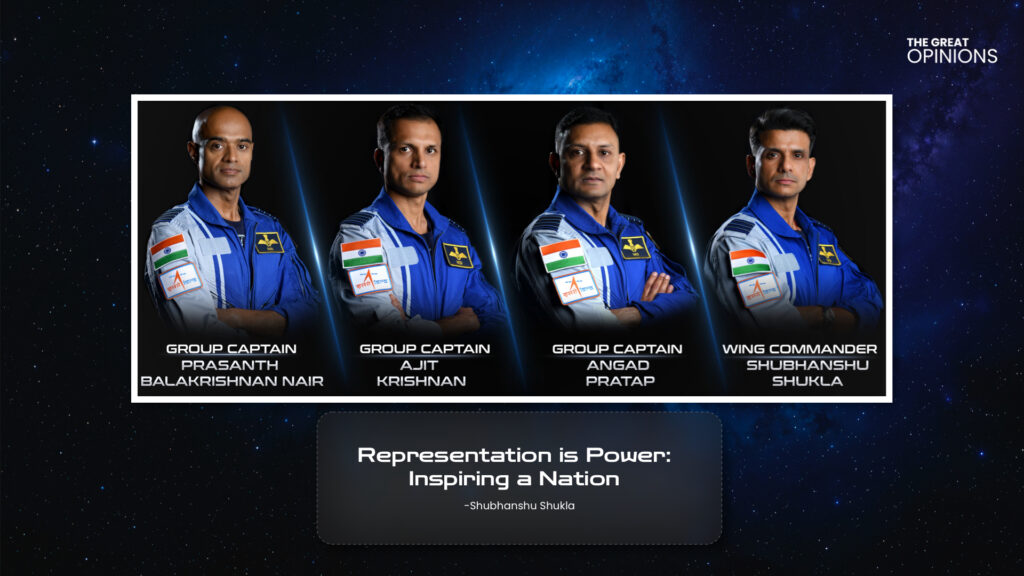
| By Indian Space Research Organisation (GODL-India), GODL-India, https://commons.wikimedia.org/w/index.php?curid=14594270 |
When Rakesh Sharma became the first Indian in space in 1984, his words “Saare Jahan Se Achha” were broadcast across the nation.
Shubhanshu Shukla carries that same weight:
- From IAF to astronaut training, he represents not just himself but India’s ambition in human spaceflight.
- India’s Gaganyaan mission (₹10,000+ crore project) is another step in this global representation.
A school in Lucknow invites him for a talk. The hall is packed. First question isn’t about rockets; it’s about roots. A boy asks, “Sir, what was shubhanshu shukla education like?” A girl asks, “Will the ISS ever have a classroom from India?” Someone else googles “shubhanshu shukla iaf” on the spot to confirm the patches on his flight suit.
He tells them the truth. That a country’s next mission starts in a library. That great labs don’t demand accents; they demand questions. That when they type “shubhanshu shukla wiki”, they should remember a wiki is built by editors—people who show up and add facts. “Be editors of your own future,” he says.
Lesson for us: Representation matters. It inspires millions back home to dream bigger.
6. Beyond Rockets: Why Space Needs All of Us

Here’s the truth: astronauts are just the face. Behind them are:
- Engineers designing life support.
- Scientists writing 200-page experiment protocols.
- Taxpayers funding billion-dollar missions.
- Students who’ll pick up where today’s astronauts leave off.
Shubhanshu often emphasizes that “space exploration is not just for astronauts. It’s humanity’s combined effort.”
The launch montage on TV shows flame, smoke, applause. What it hides: machinists who milled the valve, coders who caught a race condition at 2 a.m., a nurse who cleared a vaccine so training wouldn’t pause, taxpayers who funded the test range. In a post-brief, a producer pitches a quick segment on “shubhanshu shukla in space.” He replies, “Do one on the woman who welded my air loop. She bought us minutes we’ll never notice.”
A week later that story trends under “shubhanshu shukla news.” Comments shift. People tag friends: you are part of this mission.
Lesson for us: Progress isn’t about one hero. It’s about ecosystems.
7. Money and Efficiency in Space
Space programs are expensive:
- ISS cost: $150 billion+ to build and maintain.
- NASA’s 2023 budget: $25.4 billion.
- ISRO’s Gaganyaan: $1.4 billion.
Shukla’s perspective: Money in space only works if paired with efficiency.
- Every kilogram launched costs $20,000+ (NASA estimate).
- Wasting 1 kg of food, water, or gear means losing lakhs of rupees in orbit.
A procurement review runs long. The spreadsheet is brutal: every kilogram to orbit costs. Water, food, cabling—each line is money. Shubhanshu argues to strip a non-critical item and add a spare seal instead. “Seals buy time; time buys safety,” he says. The room nods.
That night, someone updates “shubhanshu shukla astronaut biography” with a bland phrase—advocates operational efficiency. The phrase misses the heat of the room, but it catches the heart of the choice: motivation (fly) + efficiency (optimize) = durable missions.
Blog readers searching “shubhanshu shukla mission” or “shubhanshu shukla nasa” want dates and acronyms. Give them one more thing: the why behind the budget lines.
Lesson for us: Whether it’s startups or space programs, wealth is created when motivation meets efficiency.
8. What Entrepreneurs Can Learn from Shukla’s Space Story
- Collaboration beats competition.
- Persistence builds legacy.
- Resilience turns failures into training.
- Teamwork is micro-action, not macro-slogans.
- Representation inspires markets (just like astronauts inspire nations).
- Efficiency multiplies money’s value.
a) Collaboration beats competition.
Story: During a multi-agency sim, a vendor’s software stalls. Instead of finger-pointing, the team reroutes through an older protocol and loses only 90 seconds. The after-action note reads: shared standards avoided a scrub. For founders reading “shubhanshu shukla wiki” for inspo—choose ecosystems, not empires.
b) Persistence builds legacy.
Story: An internal panel passes on his crew slot. He stays on console, crushes three unglamorous shifts, mentors two juniors, re-applies—and gets the slot. If you’re tracking “shubhanshu shukla age”, track attempt count instead. That number predicts outcomes.
c) Resilience turns failures into training.
Story: A NASA-issue sim throws triple faults. They stabilize two, miss one, and the run ends in a “loss of crew.” They debrief hard. Two weeks later the same triple fault appears; this time they land it cold. In startups, that’s your post-mortem → playbook loop.
d) Teamwork is micro-action.
Story: He’s dehydrated after a four-hour pool run. A crewmate floats over a strawed packet without a word. If you’re writing a Shubhanshu Shukla astronaut biography, make a subhead called “Small saves.” That’s culture.
e) Representation inspires markets.
Story: After a school talk, applications spike for an aerospace program tagged “shubhanshu shukla education.” Alumni build a makerspace. A parent donates a 3D printer. That’s pipeline creation—exactly what good news coverage should amplify.
f) Efficiency multiplies money.
Story: He swaps one heavy tool for a lighter multi-use kit and frees mass for a second sensor. The sensor catches a micro-leak in a ground test. The log reads boring. The outcome saves weeks. That’s the math behind your mission ROI.
Key Takeaway
Shubhanshu Shukla’s journey is not just about becoming an astronaut. It’s about showing that persistence, resilience, teamwork, and efficiency are universal principles — whether you’re piloting a fighter jet, leading a space mission, or building a startup.
At the end of the day, space is not just about rockets. It’s about people, values, and the mindset to keep moving forward — even when alarms go off.
Sources:
- Shubhanshu Shukla Wikipedia — biography, mission details, education etc.
https://en.wikipedia.org/wiki/Shubhanshu_Shukla - Axiom Space Astronaut: Shubhanshu Shukla — official Axiom page with career info
https://www.axiomspace.com/astronaut/shubhanshu-shukla - Britannica entry on Shubhanshu Shukla — education, Air Force, mission role
https://www.britannica.com/biography/Shubhanshu-Shukla - Times of India — Indian astronaut Shubhanshu Shukla shares how CPR is done in space
https://timesofindia.indiatimes.com/etimes/trending/indian-astronaut-shubhanshu-shukla-shares-the-shocking-way-cpr-is-performed-in-space/articleshow/124074923.cms - Times of India — Shukhla claims first module of Bharatiya Antariksh Station to launch soon
https://timesofindia.indiatimes.com/science/6-bhk-apartment-astronaut-shubhanshu-shukla-says-first-module-of-bharatiya-antariksh-station-to-launch-soon-explains-design/articleshow/124112893.cms - The Guardian — India sends its first astronaut Shubhanshu Shukla as part of mission to ISS
https://www.theguardian.com/world/2025/jun/09/indian-astronaut-shubhanshu-shukla-join-mission-to-international-space-station - Times of India — NASA-ISRO collaboration, microgravity experiments by Shukhla in Axiom Mission 4
https://timesofindia.indiatimes.com/science/nasa-isro-collaboration-shubhanshu-shuklas-microgravity-experiments-on-axiom-4-mission/articleshow/121724262.cms - Economic Times — Axiom Mission-4 a success for India and Gaganyaan says Shubhanshu Shukla
https://economictimes.indiatimes.com/tech/technology/axiom-mission-4-a-success-for-india-and-gaganyaan-says-astronaut-shubhanshu-shukla/articleshow/123048277.cms - Times of India — Chief Minister of UP congratulates Shukla for mission to ISS
https://timesofindia.indiatimes.com/city/lucknow/proud-moment-for-india-cm-hails-shukla/articleshow/122077143.cms
IndiaTimes — Shubhanshu Shukla pens emotional farewell to his wife before space journey
https://indiatimes.com/trending/shubhanshu-shukla-pens-emotional-farewell-to-wife-kamna-just-before-space-journeyheres-what-he-said-662163.html
